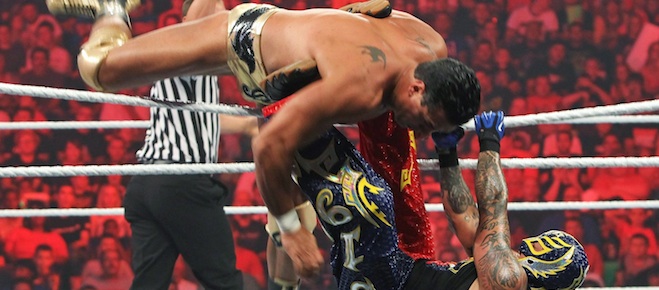WWE keeps on rolling—in cash
When it comes to making money, the Hogan era is no match for today’s men in tights
Alberto Del Rio flips over the top of Rey Mysterio as they leave the ring during WWE Monday Night Raw on Monday, July 23, 2012, in St. Louis. (AP Photo/St. Louis Post-Dispatch, J.B. Forbes) EDWARDSVILLE OUT ALTON OUT
Share

Back when Hulk Hogan was the WWF champion—leg-dropping Nikolai Volkoff and body-slamming André the Giant—children everywhere ate their vitamins and said their prayers. Hulkamania was as much a part of the 1980s as Cyndi Lauper and leg warmers. Even now, approaching his 60th birthday, Hogan and his “24-inch pythons” are synonymous with professional wrestling. (Quick, name the current belt-holder.)
But when it comes to making money, the Hogan era is no match for today’s men in tights. As improbable as it sounds, the WWE (as the federation is now called) has never been more successful.
Despite the emergence of mixed martial arts—with real violence and real victories—the scripted soap opera of pile drivers and Royal Rumbles is not only surviving, but thriving. The latest installment of Wrestlemania (No. 28) drew a record pay-per-view audience of 1.2 million. The WWE’s signature show, Monday Night Raw, recently celebrated its 1,000th episode. And earlier this month, during a conference call with analysts, CEO Vince McMahon said the publicly traded company is on the cusp of launching its very own cable network, à la Oprah. “I hope next quarter I will be making an announcement,” he said.
Next up? Pinning down China.
In 2010, the WWE made its inaugural visit to China, handing out an arena’s worth of free tickets to anyone willing to go. Last week, the wrestlers returned to Shanghai—where customers happily paid up to US$235 a ticket. “I’m here for the hot guys,” said one woman. Another local, who organizes a WWE fan club, said she got hooked after stumbling across wrestling on her satellite TV. “Boxing is boring,” she told one reporter, “but professional wrestling has a plot.”
Ed Wells, the WWE’s senior vice-president for international operations, said the company’s growth in China has consistently been in “double digits” since 2007. The product has grown so popular, in fact, that there’s talk about introducing a Chinese character to the roster. “We’d love to have a Chinese star,” Wells said. “And we’re certainly open to working with Chinese talent.”